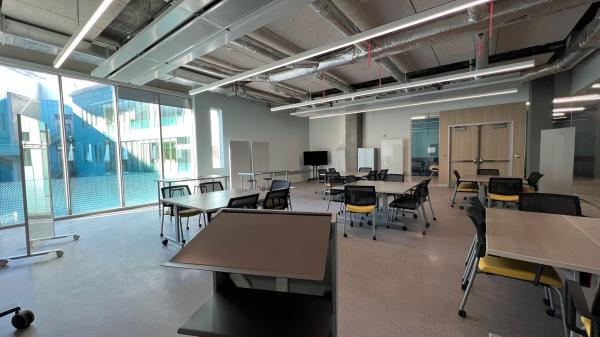FAQ
What is the Humanities Lab?
The Humanities Lab offers problem-focused, humanities-based but interdisciplinary courses designed to produce a collaborative, exploratory learning experience. To achieve this, Lab courses are organized around questions and sub-questions—Why are there immigrants? How has the automobile shaped American society? What is the best way to feed the world’s population?–rather than around topics or historical periods. Labs are team-taught by faculty from different disciplines and include students of varying ages and disciplinary backgrounds. Students and faculty collaborate to connect the dots between ideas, events, beliefs, images and data to address grand social challenges in a holistic way from diverse perspectives. At the semester’s end, student teams share their research outcomes and approaches to their Lab’s challenge with varying publics.
What do you mean by ‘Lab’?
Labs (or laboratories) are typically spaces designed for scientific inquiry through collaborative analysis and experimentation to assess and address problems. The Humanities Lab borrows from that design by coordinating research goals and taking shared responsibility for learning outcomes while also developing and utilizing arts and humanities content and methodologies that reveal deeper themes and questions underlying problems. Humanities inquiry moves the investigation from “what?” to “why?” and takes solutions from “what could be done?” to “what should be done?”
What are examples of grand social challenges?
Grand social challenges include problems such as the refugee crisis, healthcare, poverty, climate change, immigration and sexual violence. Grand social challenges have no easy answers.
Why a Humanities Lab?
Social challenges need humanities leadership. Most of the really big challenges the world faces are not fundamentally about technology, science, economics, etc. Rather, they are human challenges that require human-centered inquiry as part of the search for solutions. One of the Lab’s goals is to serve as a gateway for students to recognize the significance and social utility of the humanities. Most grand social challenges entail what the humanities focus on—history, language, ideas, beliefs, assumptions—and cannot be solved by one academic field alone. That’s why the Lab offers interdisciplinary inquiry utilizing collaborative, intergenerational, problem-focused, teaching and learning strategies.
How does a Humanities Lab course work?
- Challenge-centric courses are team-taught using interdisciplinary, inquiry-based learning strategies.
- Labs are open to students at diverse levels and from varying disciplinary backgrounds, so Labs span age groups and intellectual interests.
- University librarians and art faculty usually serve as consultants to Lab courses.
- Lab teams often work with community organizations and field experts during their inquiry process.
- Students conduct original research and identify resources that help them address their Lab’s challenge.
- Students work in teams and address challenges collaboratively.
- Student teams develop projects and products (videos, presentations, op-ed pieces, art objects, performances, proposals) that enable them to share their learning with appropriate publics.
What types of outcomes can be expected from Lab courses?
Outcomes can range from op-ed pieces to performances, art exhibits, public dialogues, videos, podcasts, e-books, poster sessions, presentations, and policy proposals. Some Labs participate in ASU’s Open Door event, Homecoming celebration, and/or Emerge exposition.
How are Humanities Lab courses different than traditional college courses?
Courses are team-taught by faculty from different academic disciplines and campus units; usually one faculty member is a humanist and the other is from the sciences, engineering, social sciences, or arts. Labs are attended by students from various disciplines and stakeholder perspectives. Students often interact with field experts and community organizations to research their approaches to challenges and achieve outcomes that they share outside of the classroom. Humanities Lab courses teach a wide range of skills, including ethical analysis, critical reasoning, inquiry-based research, creativity, team building and collaboration with diverse groups.
How are students prepared to address grand social challenges upon program completion?
Lab students are immersed in the inquiry process and work collaboratively with diverse peer groups and faculty. They learn to navigate complexity as they seek to create outcomes to be shared with public audiences. They learn what it takes to be a leader, to take ownership of their ideas, and to be accountable to the community, nation and world.
Is the Humanities Lab part of the other humanities campus initiatives?
The Humanities Lab is a distinct entity, and is not directly affiliated with ASU’s Institute for Humanities Research or ASU’s Project Humanities. The Humanities Lab is the only humanities initiative on campus that offers academic courses.
Where is the Humanities Lab located?
Our primary Humanities Lab is located in the Center for Centers on the second floor of the newly renovated Durham Hall. We also have a lab space in Room 409 of ISTB7.
What does the Lab look like?
The Lab is a space for experimentation and presents a dynamic workspace, offering caster clad rolling tables, chairs and 6’ tall rolling white boards for easy workflow configuration. The Lab also features rough tables for project work, large screen televisions, zoom technology, microphones and cameras designed to connect the classroom to experts and cultural experiences worldwide.
Can anyone sign up for a Lab course?
The Humanities Lab welcomes all students, and hosts courses that are cross-listed among disciplines, so that students may gain credits within their respective programs. Courses span from 200 level through graduate level courses, and may be offered as capstones in specific programs. Some Labs have also been affiliated with students from the OSHER LifeLong Learning Institute, which offers courses to those aged 50+.
What courses are currently offered/have been offered/are coming up?
Our Labs change every semester! Click here to view what we currently offer and to view what's coming up next.
Past Humanities Labs have included: Indigenizing Food Systems; Energy and Social Justice; Decolonizing 'Madness'; Narrating Global Development; and Humanizing Digital Culture. Click here to view all of our past Labs and their impact outcomes.
Why ASU?
A Humanities Lab would be an important innovation in any university. But it is especially appropriate at ASU because of the institution’s commitment to innovation, including in teaching and knowledge creation, and because of ASU’s diverse student body.
